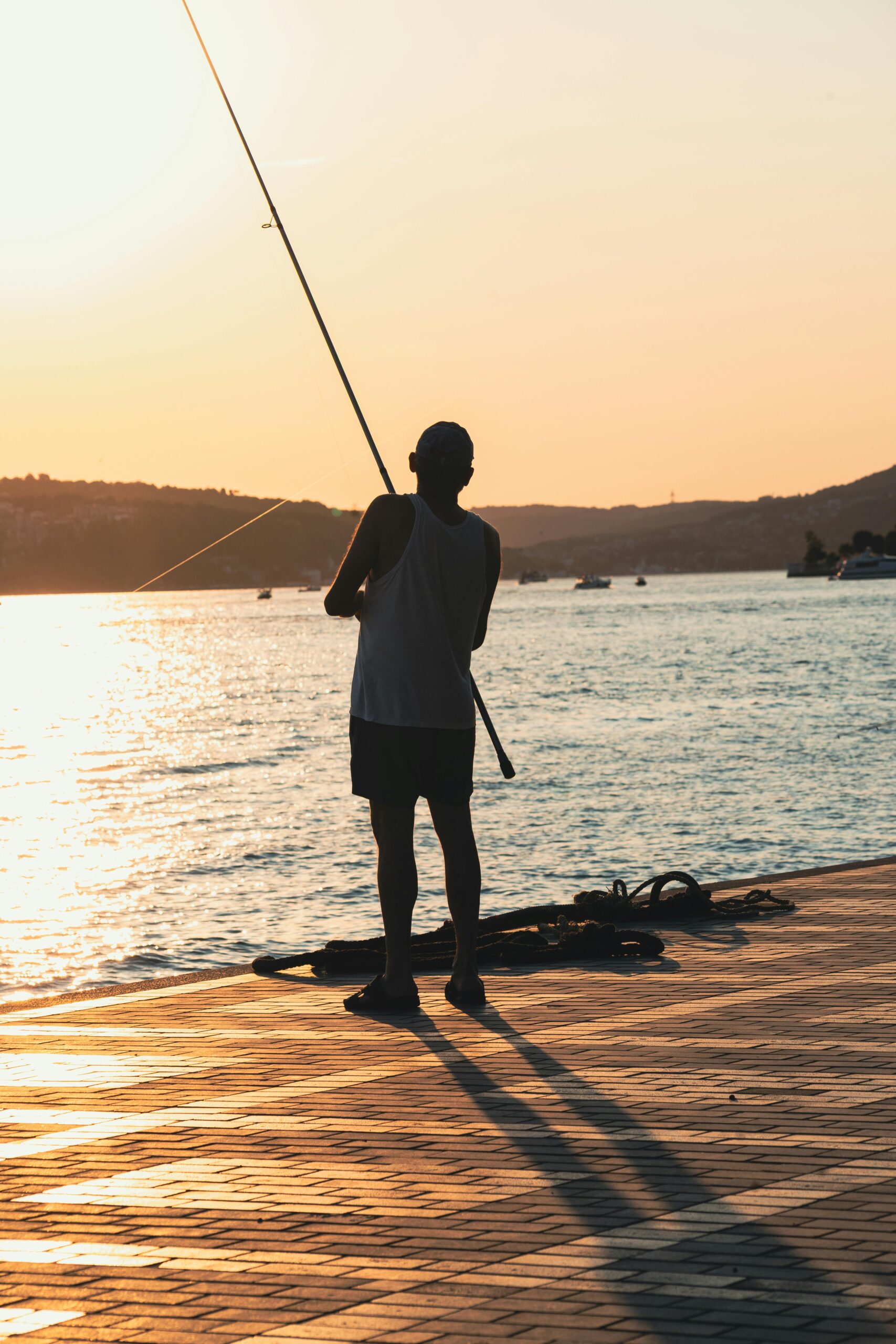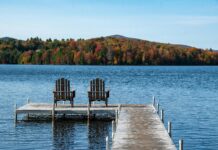Are you ready to dive into the thrilling world of Vermont fishing? If you’ve ever wondered how to unlock amazing fishing adventures in this picturesque state, then getting your Vermont fishing license is the very first step you can’t afford to miss. Whether you’re a seasoned angler or a curious beginner, understanding the ins and outs of obtaining a Vermont fishing license opens doors to some of the most spectacular fishing spots in New England. But what makes Vermont stand out? And how does this simple permit transform your fishing experience into an unforgettable outdoor escapade?
Fishing enthusiasts often overlook the importance of securing a valid Vermont fishing license, yet it’s absolutely essential for legal and hassle-free angling throughout the state’s pristine lakes, rivers, and streams. From the legendary trout streams to the tranquil shores of Lake Champlain, having the right license gives you access to a variety of fish species, including brook trout, landlocked salmon, and smallmouth bass. But did you know that Vermont offers multiple license options tailored for residents, non-residents, youth, and even seniors? This flexibility ensures everyone can join in on the fun without breaking the bank.
So, how do you get your hands on a Vermont fishing license online, and what are the rules you need to follow to stay on the right side of the law? In this guide, we’ll explore everything you need to know—from where to buy your license, the cost breakdown, to important regulations and tips for making the most of your fishing trip. Get ready to cast your line with confidence and discover why Vermont is quickly becoming a hotspot for unforgettable fishing adventures that anglers can’t stop talking about!
How to Get Your Vermont Fishing License: Step-by-Step Guide for 2024
How to Get Your Vermont Fishing License: Step-by-Step Guide for 2024
Fishing in Vermont is one of the most relaxing and enjoyable outdoor activities you can do. From the tranquil lakes to flowing rivers, the Green Mountain State offers a wide range of fishing opportunities for beginners and experienced anglers. But, before you can cast your line into the water, you need to get your Vermont fishing license. It’s a must-have for anyone wanting to fish legally in the state. The process might seem a bit confusing at first, but don’t worry—you’ll be ready for your next fishing adventure in no time. This step-by-step guide for 2024 will show you how to get your Vermont fishing license, unlocking amazing fishing adventures throughout the year.
Why You Need a Vermont Fishing License
Vermont fishing licenses are not just a piece of paper you buy for fun. They help fund conservation efforts, maintain fish habitats, and ensure sustainable fishing practices. If you ignore this requirement, you risk fines or losing your fishing privileges. The state wants to protect its natural resources, and licensing is a part of that bigger picture.
Historically, Vermont started requiring fishing licenses back in the early 1900s, when overfishing became a concern and fish populations began to decline. Today, these licenses support programs that stock lakes and rivers, monitor fish populations, and educate the public about responsible fishing.
Types of Vermont Fishing Licenses Available in 2024
You might be wondering, “Which fishing license do I need?” Vermont offers several types depending on your age, residency status, and how long you plan to fish. Here’s a list to help you choose:
- Resident Annual Fishing License: For Vermont residents, valid for one year.
- Non-Resident Annual Fishing License: For visitors planning to fish multiple times a year.
- 7-Day Non-Resident Fishing License: Short-term license for visitors staying briefly.
- Youth Fishing License: Usually for anglers under 16 years old, sometimes free or discounted.
- Lifetime Fishing License: A one-time purchase for residents who frequently fish.
- Combination Licenses: Includes fishing plus hunting or trapping privileges.
Prices vary depending on the license type, with resident licenses generally cheaper than non-resident ones. For example, a resident annual fishing license typically cost about $30, while the 7-day non-resident license can be around $20.
Step-by-Step Guide to Getting Your Vermont Fishing License in 2024
Getting your Vermont fishing license is easier than many think. Follow these steps carefully and you’ll be ready to fish legally in no time:
Check Your Eligibility
First, determine if you qualify as a resident or non-resident. Vermont residents usually have to provide proof of residency such as a driver’s license or state ID. Non-residents just need to know which license fits their fishing plans.Decide on License Type
Choose between annual, 7-day, lifetime, or youth licenses. Think about how often you will fish and how long you plan to stay.Gather Required Information
You will need personal details like your full name, date of birth, and contact information. Also, have your payment method ready—it can be a credit card for online purchases.Choose How to Buy Your License
- Online: The easiest way is through the Vermont Fish & Wildlife Department’s website. It’s available 24/7 and you can print your license immediately.
- In-Person: Visit authorized vendors like outdoor stores, town clerks, or Fish & Wildlife offices.
- By Phone: Some people prefer calling the department to order their license.
Complete the Application
Whether online or in-person, fill out the form with accurate info. Mistakes can delay your license or cause legal issues later.Pay the Fee
Fees vary as mentioned, so double-check the amount before paying. Payment is usually accepted by credit card, check, or cash (if in person).Receive and Keep Your License
After payment, you’ll get a physical or digital license. Keep it with you while fishing, as game wardens may ask to see it.
Important Things To Know About Vermont Fishing Licenses
- License Validity: Most licenses are valid for one calendar year from the date of purchase, but some expire on December 31st each year. Always check the expiration date.
- Age Requirements: Anglers under 15 usually do not need a license, but rules can change so confirm with the latest info.
- Fishing Regulations: Having a license doesn’t mean you can fish anywhere or anytime. Vermont has specific rules about seasons, catch limits, and protected species. Make sure to read the fishing regulations
Top 7 Must-Know Tips for Unlocking Vermont’s Best Fishing Spots with a License
Vermont is a paradise for anglers, with its pristine lakes, rivers, and streams offering some of the best fishing experiences in New England. But before you cast your line into these waters, you gotta understand the importance of having a Vermont fishing license. It’s not just a legal requirement but also a key that unlocks access to many amazing fishing spots across the state. Whether you are a newbie or a seasoned fisherman, knowing how to get and use your Vermont fishing license properly can seriously improve your fishing adventures. In this article, we will explore the top 7 must-know tips for unlocking Vermont’s best fishing spots with a license that every angler should know.
What Is a Vermont Fishing License and Why You Need It
First things first, Vermont fishing license is a permit issued by the Vermont Fish & Wildlife Department. It allows residents and visitors to fish in Vermont’s public waters legally. The license is not just a ticket for fishing but supports conservation efforts and fishery management programs. Without it, you risk fines or penalties which can ruin your fishing trip before it even start.
Vermont offers different types of licenses depending on your age, residency, and the duration you plan to fish. Here are the main types:
- Resident annual fishing license
- Non-resident annual fishing license
- 3-day and 7-day licenses for visitors
- Lifetime licenses for residents (available after certain criteria)
- Free licenses for youths under 15, but with restrictions
Buying a license is easy and can be done online or at various sporting goods stores around Vermont.
1. Know Where to Get Your License in Vermont
You might think buying a license is simple, but knowing where to buy it can save you a lot of time. Vermont Fish & Wildlife website is the official place to purchase your fishing license online. Besides that, many local bait shops, outdoor retailers, and some town clerks also sell licenses. Some places offer walk-in service, others only online orders. Checking before you go helps avoid any last-minute scramble.
2. Understand the Different Fishing Seasons in Vermont
Vermont’s fishing seasons vary by species and water body. For instance, trout fishing season usually opens in mid-April and runs until late October or November. Bass fishing has different seasons and regulations. Knowing these seasons helps you plan your trips around the best times to catch specific fish.
Here is a simple table outlining popular fish and their general seasons in Vermont:
| Fish Species | Season Start | Season End |
|---|---|---|
| Brook Trout | April 15 | October 31 |
| Brown Trout | April 15 | October 31 |
| Rainbow Trout | April 15 | October 31 |
| Largemouth Bass | May 15 | November 30 |
| Smallmouth Bass | May 15 | November 30 |
| Northern Pike | May 15 | November 30 |
3. Explore Public Fishing Access Sites with Your License
Vermont has many public fishing access points throughout the state. These spots are often easily accessible and free to use once you have a valid fishing license. Some of the most popular public fishing areas include Lake Champlain, the Winooski River, and the Battenkill River. Each site offers unique fishing experiences from fly fishing in fast rivers to lake fishing for big bass or pike.
4. Follow Vermont’s Fishing Regulations Carefully
It’s easy to get lost with all the size limits, daily catch limits, and bait restrictions in Vermont. For instance, certain waters might have catch-and-release rules, especially for native trout species. Some areas restrict the type of bait or lures you can use. Always check the Vermont Fish & Wildlife Department’s current fishing regulations before heading out. Breaking these rules can lead to fines and spoil the fun.
5. Use Your License to Access Special Fishing Opportunities
Having a Vermont fishing license doesn’t just give you access to regular fishing areas. It also opens doors to special programs and events like the Vermont Youth Trout Day or catch-and-release tournaments. Sometimes, license holders get priority access to certain fishing spots or stocking events. Keep an eye on local fishing news and Vermont Fish & Wildlife announcements to catch these exclusive chances.
6. Save Money with Combination Licenses
If you are planning to do more outdoor activities in Vermont, consider buying combination licenses. Vermont offers packages that include both fishing and hunting licenses. These can save you money if you want to enjoy multiple outdoor sports during your visit. For example, a combination license might be cheaper than buying separate permits for fishing and small game hunting.
7. Respect Vermont’s Natural Environment While Fishing
Vermont’s waters are clean, cold, and rich in biodiversity. Using your fishing license responsibly means respecting the environment. Always clean up your fishing gear, avoid disturbing wildlife, and follow catch limits to keep fish populations healthy. Leave no trace principles apply here. By
Vermont Fishing License Costs and Requirements: What Every Angler Needs to Know
Vermont is a paradise for fishing lovers, with its crystal-clear lakes, rivers, and ponds offering countless spots for anglers to enjoy. But before you cast your line into the waters of the Green Mountain State, you gotta understand the ins and outs of Vermont fishing license costs and requirements. Many folks overlook this step, thinking it’s a minor detail, but it can make or break your fishing trip, especially if you’re not aware of the rules. So, in this article, we gonna break down everything you need to know about getting a Vermont fishing license, why it’s important, and how to use it to unlock amazing fishing adventures.
Why Do You Need a Vermont Fishing License?
Fishing without a license in Vermont is illegal and can lead to fines or penalties. The state requires anglers to have a valid fishing license to protect fish populations and maintain sustainable wildlife environments. This helps fund conservation efforts, habitat restoration, and fisheries management programs. Without licenses, Vermont’s fishing spots would suffer from overfishing and environmental damage. So, think of the fishing license not just as a ticket, but as your contribution to keeping Vermont’s waters healthy and teeming with fish.
Vermont Fishing License Costs: What You Should Expect
Vermont offers various types of fishing licenses depending on your residency status, age, and duration of license validity. The fees are quite reasonable compared to other states in New England, but they do change from time to time, so check the official Vermont Fish & Wildlife website before buying.
Here’s a rough outline of the 2024 Vermont fishing license fees:
- Resident Annual Fishing License: $25.50
- Non-resident Annual Fishing License: $48.00
- Resident 3-Day Fishing License: $12.00
- Non-resident 3-Day Fishing License: $24.00
- Youth (under 16 years): Free (no license required)
- Senior Resident (65 and older): $10.00
Besides these, you might also need a trout and salmon stamp if you plan to fish for those species, which costs an additional $10 for residents and $15 for non-residents. This stamp is mandatory to fish in waters stocked with trout or salmon.
How to Get Your Vermont Fishing License?
Getting a fishing license in Vermont is pretty straightforward but can feel confusing if you never done it before. You can buy a license online, at authorized vendors (like sporting goods stores or town clerks), or at some Vermont Fish & Wildlife offices.
To buy online, you just visit the Vermont Fish & Wildlife Department’s website, fill in your details (name, address, date of birth), and pay by credit card. Once purchased, you can print your license immediately or download it to your phone. No need to wait or mail anything.
If you prefer buying in person, bring a valid ID and payment method. Some places accept cash only, others cards.
Important Vermont Fishing License Requirements
There are some rules that every Vermont angler must follow to stay legal:
- Always carry your fishing license with you while fishing. If a fisheries officer asks, you must produce it immediately.
- Only fish during legal hours, which usually means from half an hour before sunrise to half an hour after sunset, unless otherwise posted.
- Follow species-specific regulations: size limits, bag limits, and seasonal restrictions vary depending on where and what you fish.
- Use legal fishing methods only. For example, some waters prohibit bait fishing or require artificial lures only.
- Respect private property and posted no-fishing zones. Vermont has many public access points, but some areas are private land.
Comparing Vermont Fishing License to Other New England States
Fishing license costs and rules vary widely in New England, so here a quick comparison to help you see where Vermont stands:
| State | Resident Annual Fee | Non-Resident Annual Fee | Youth License | Special Stamps Required |
|---|---|---|---|---|
| Vermont | $25.50 | $48.00 | Free under 16 | Trout & Salmon Stamp |
| New Hampshire | $24.00 | $55.00 | Free under 15 | Trout Stamp |
| Maine | $25.00 | $45.00 | Free under 15 | No |
| Massachusetts | $30.00 | $45.00 | Free under 15 | No |
| Connecticut | $25.00 | $50.00 | Free under 16 | No |
From this, you see Vermont’s fees are competitive and the trout stamp is an extra cost you should remember.
Unlocking Amazing Fishing Adventures With Your Vermont Fishing License
Once you got your license, the real fun begins. Vermont offers a wide range of fishing experiences for all skill
Exploring Hidden Gems: Where Your Vermont Fishing License Grants Access to Prime Fishing Adventures
Vermont, known for its picturesque landscapes, rolling hills, and quaint towns, is also a treasure trove for fishing enthusiasts. If you have a Vermont fishing license, you unlock access to some of the most amazing fishing adventures across the state. But many anglers don’t realize just how many hidden gems are waiting to be explored, right inside Vermont’s borders. This article will takes you on a journey to discover those secret fishing spots, explain how to get your Vermont fishing license, and what makes this license a key to unforgettable outdoor experiences.
Vermont Fishing License: What You Need to Know
Before you cast your line, it’s important to understand the basics about Vermont fishing license. The state requires anyone age 15 and older to have a valid fishing license to fish in public waters. This rule applies to both residents and visitors. The license system helps support fish conservation programs and maintain healthy fish populations, which means better fishing for everyone.
Here’s a quick overview of the types of licenses available in Vermont:
- Annual Resident Fishing License: For Vermont residents, valid for one year.
- Annual Non-Resident Fishing License: For visitors who want to fish multiple times throughout the year.
- Short-Term License: Available for 1, 3, or 7 days, perfect for tourists or casual anglers.
- Combination Licenses: Combining fishing with other outdoor activities like hunting or trapping.
You can buy your license online through the Vermont Fish & Wildlife Department website, or at local retailers like bait shops and sporting goods stores. Prices vary, but the convenience and legal access it provides is worth it.
Unlocking Amazing Fishing Adventures with Your License
Having a Vermont fishing license is like holding a key that opens doors to some incredible fishing locations. Vermont is home to thousands of lakes, ponds, rivers, and streams, many of which are stocked regularly with trout and other popular game fish. But beyond the well-known spots, there are lesser-known areas that offer peaceful, uncrowded fishing experiences.
Some hidden gems where your fishing license grants you access:
- Nulhegan Basin: Located in the Northeast Kingdom, this remote wetland area is a haven for brook trout fishing. The surrounding wilderness makes it an adventure for those willing to explore off the beaten path.
- Moosalamoo National Recreation Area: Nestled in the Green Mountains, this area features several pristine lakes and streams, perfect for catching lake trout and landlocked salmon.
- Lake Willoughby: Often referred to as one of the clearest lakes in the region, it’s a prime spot for anglers looking for trout and bass in a stunning glacial lake setting.
- Battenkill River: Known for its excellent fly fishing, this river runs through southern Vermont and is stocked with rainbow and brown trout.
Practical Tips for Fishing in Vermont
Fishing in Vermont can be rewarding but comes with its own set of rules and tips that every angler should know. Here is a quick checklist to make your trip successful and enjoyable:
- Always check the Vermont Fish & Wildlife regulations for size limits, catch limits, and season dates.
- Use the right bait and tackle for the species you target; for example, trout often respond well to live bait or artificial flies.
- Respect private property boundaries; many great fishing spots are on or near private lands.
- Practice catch and release where possible to help preserve fish populations.
- Be prepared for varying weather conditions, especially in mountainous areas where it can change quickly.
Comparing Vermont’s Fishing License to Neighboring States
If you’re planning a fishing trip in New England, it might be useful to compare how Vermont’s system stacks up against neighboring states like New Hampshire, Maine, and Massachusetts.
| Feature | Vermont | New Hampshire | Maine | Massachusetts |
|---|---|---|---|---|
| License Required | Yes, 15 and older | Yes, 16 and older | Yes, all ages | Yes, 16 and older |
| Resident Annual License | Around $27 | Around $29 | Around $25 | Around $30 |
| Non-Resident Annual License | Around $50 | Around $65 | Around $47 | Around $50 |
| Short-Term Options | 1, 3, 7 days | 1, 3, 7 days | 1, 7 days | 1, 7 days |
| Combination Licenses | Yes | Yes | Yes | Yes |
| Online Purchase | Yes | Yes | Yes | Yes |
Vermont offers very competitive prices and flexible options, making it an attractive choice for anglers who want to experience diverse fishing environments.
Historical Context: Fishing in Vermont
Fishing has deep roots in Vermont’s history. Indigenous peoples, including the Abenaki
Frequently Asked Questions About Vermont Fishing Licenses: Expert Answers for New Anglers
Vermont, with its picturesque landscapes and abundant waterways, offers some of the best fishing experiences in New England. For new anglers eager to cast their lines into its pristine lakes and rivers, understanding Vermont fishing licenses becomes essential. Many people often get confused about what type of license they need, how to get one, and the rules that come with it. This article answers some frequently asked questions about Vermont fishing licenses and unlocks the door to amazing fishing adventures in the Green Mountain State.
What Is a Vermont Fishing License and Why You Need It?
A Vermont fishing license is an official permit that allows residents and visitors to fish in Vermont’s public waters. It is required by law for most types of fishing activities unless you fall into a specific exemption category. Without it, fishing can lead to fines or penalties, so it’s better to get one before you start fishing.
The license helps the Vermont Fish & Wildlife Department manage fish populations and conserve aquatic ecosystems. When you buy a license, part of your fee goes towards maintaining rivers, lakes, and fish habitats, which benefits all anglers.
Types of Vermont Fishing Licenses Available
Depending on your age, residency status, and fishing preferences, you can choose from several types of Vermont fishing licenses. Here’s a quick breakdown:
- Resident Annual License: For Vermont residents, valid for one year.
- Non-Resident Annual License: For people living outside Vermont, good for a full year.
- Short-Term License: Available for 1-day or 7-day periods, popular among tourists.
- Youth License: For children under a certain age, often free or discounted.
- Combination License: Includes fishing plus hunting permits for multi-sport enthusiasts.
Each license type has different costs and regulations. For example, a resident annual license usually costs less than a non-resident one, reflecting the state’s preference for encouraging local anglers.
How To Buy a Vermont Fishing License
Purchasing a fishing license in Vermont is straightforward but sometimes people miss steps or feel overwhelmed. You can get your license:
- Online through the official Vermont Fish & Wildlife website.
- At authorized vendors like sporting goods stores, town clerks, or bait shops.
- By phone, although this method is less common.
When buying, you’ll be asked to provide some information such as your name, address, date of birth, and residency status. Also, make sure to carry your license with you whenever fishing, because game wardens may check it at any time.
Common Questions New Anglers Ask About Vermont Fishing Licenses
People new to fishing often ask similar questions. Below are some of the most frequent ones:
Q: Do kids need a fishing license in Vermont?
A: Children under 15 years old do not need a license to fish in Vermont. However, it’s good to check the current regulations because rules can change.
Q: Can I fish without a license on my own private property?
A: Yes, if you fish on your private land without accessing public waters, you don’t need a license. But if you use public waters or fish from a public area, a license is required.
Q: What species can I catch with a Vermont fishing license?
A: A standard fishing license covers most freshwater species including trout, bass, pike, and perch. There are special rules for certain species like salmon or sturgeon, so always check the current fishing regulations.
Q: Is catch-and-release fishing allowed with a license?
A: Yes, Vermont encourages catch-and-release, especially for certain species or during specific seasons to protect fish populations.
Comparison of Vermont Fishing License Fees (2024)
| License Type | Resident Fee | Non-Resident Fee | Duration |
|---|---|---|---|
| Annual License | $25 | $50 | 1 year |
| 7-Day License | $15 | $30 | 7 days |
| 1-Day License | $7 | $15 | 1 day |
| Youth License (Under 15) | Free | Free | N/A |
Prices might vary slightly over the years, but this table gives a general idea for planning your budget.
Tips for New Anglers in Vermont
Starting your fishing adventure in Vermont can be exciting but also confusing without guidance. Here are some practical tips:
- Check the season dates: Fishing seasons vary by species and location. Make sure the species you want to catch are in season.
- Bring the right gear: Vermont waters have different fish types, so your tackle should match your target species.
- Respect catch limits: Always follow the rules about how many fish you can keep. Limits help sustain fish populations.
- Learn fishing regulations: Vermont publishes a fishing guide annually that details all rules, including size
Conclusion
In conclusion, obtaining a Vermont fishing license is a straightforward and essential step for anyone looking to enjoy the state’s abundant fishing opportunities legally and responsibly. Whether you are a resident or a visitor, understanding the different types of licenses, eligibility requirements, and how to purchase them online or in person ensures a hassle-free experience. Remember that adhering to Vermont’s fishing regulations, including size and catch limits, helps preserve aquatic ecosystems and supports sustainable fishing practices for future generations. By securing the appropriate license, anglers not only comply with state laws but also contribute to conservation efforts that maintain Vermont’s pristine waterways. So, before you cast your line in one of Vermont’s beautiful lakes or rivers, make sure to get your fishing license and embrace the rewarding experience of fishing while protecting the environment. Start your fishing adventure today by visiting the official Vermont Fish & Wildlife website to buy your license and access valuable resources.









